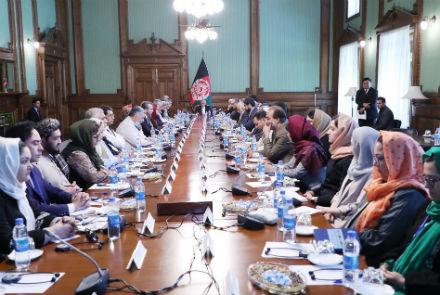As talks between the US and Taliban resume this month, both sides are reportedly closer to an agreement tying a US troop withdrawal to Taliban guarantees not to allow foreign militant groups to attack the United States or to operate on Afghan soil. But many Afghans have raised concerns about what a settlement would mean for important gains since 2001, including constitutional guarantees protecting human rights.
The talks are proceeding on the basis that a political settlement is needed to end the war. But the idea that the fate of human rights protections might depend on a power-sharing arrangement between Taliban leaders and the current line-up of Afghan politicians vying for a seat at the talks should set off alarm bells, particularly for Afghans concerned about women’s rights and freedom of expression.
Afghanistan’s donors, particularly the US, should insist that civil society groups, women, and Afghans from diverse backgrounds, rural and urban, fully participate in the intra-Afghan dialogue that is supposed to be one of the “pillars” of the peace talks. And the donors should financially and politically support their inclusion.
In preparing for negotiations with the Taliban, Afghanistan’s political elite seems more concerned with lining up support from prominent strongmen among their ranks, many with terrible human rights records, than addressing human right concerns. Former mujahedin leaders have called for “inclusivity” in the peace talks, but this is coded language for giving them important slots on any negotiating team or interim government.
This is the wrong kind of inclusion. Those participating in the intra-Afghan talks should include the reformers—many of them women—who have backed essential human rights progress over the past 17 years. It should also listen to those who have paid the highest price for the war. These include families of those killed in airstrikes and suicide bombings or murdered by insurgents and pro-government militias; women who have endured debilitating discrimination; people with disabilities, including tens of thousands of veterans; and victims of police torture, enforced disappearances, land-grabbing, and other abuses.
Most of the gains in girls’ education, women’s rights and media freedom after 2001 came about only through the concerted efforts of activists and other reformers, backed by political pressure from donors—often over the objections and persistent resistance of some Afghan officials, strongmen, and politicians. External support can be decisive, as in 2004 when reform-minded delegates faced opposition from the many warlords who participated in the process for drafting Afghanistan’s new constitution. The reformers had strong backing from donors, which helped ensure that the constitution would contain guarantees of women’s equality and human rights.
The Taliban have now indicated they would seek to change key aspects of the constitution, though they have not been specific. For amendments that would scuttle human rights protections, they may actually find allies among some government officials and politicians who have benefitted from the country’s pervasive impunity for abuses. To ensure that those negotiating any constitutional changes do not undermine rights protections, the US and other donors need once again to use their leverage to support those fighting for fundamental rights.
The rights situation is fragile. Afghanistan’s media have experienced an enormous growth of news outlets and a relatively free press—something the country never had even under pre-Taliban governments. But in recent years threats and abuses by government officials, warlords, and security forces, together with devastating attacks by groups tied to the Islamic State, the Taliban and other insurgents, have forced more than 100 media outlets to close. The Taliban have demonstrated no tolerance for any media other than their own propaganda. Afghan leaders who say they want to ensure that the Taliban respect the gains made in the past 17 years would have more credibility if they supported prosecutions of officials and warlords responsible for attacks on Afghan journalists.
Many Afghan women now hold public office, an achievement that has changed the face of Afghan politics in positive ways both at home and abroad. But Afghan women continue to face unrelenting violence, discrimination and sexual harassment. Because of the efforts of activists and reformers in the government, Afghanistan now has laws criminalizing such abuse, but enforcing these law remains a serious challenge. Afghan politicians seeking a role in talks with the Taliban may say they will defend women’s rights, but how many have called for the prosecution of the head of the Afghan Football Federation, whom the attorney general has indicted for sexually assaulting members of the Afghan women’s team and who has yet to be arrested?
Gains made since 2001 have also disproportionately benefitted urban areas, leaving behind rural areas that have borne the brunt of the conflict and endured serious human rights abuses. Elections have been disputed and riddled with fraud, with rural areas among the worst affected, leaving many rural dwellers virtually disenfranchised.
A process that invites the views of Afghan victims from all sides of the conflict would be more genuinely inclusive than anything the current interlocutors have proposed.
Patricia Gossman is associate Asia director at Human Rights Watch.

